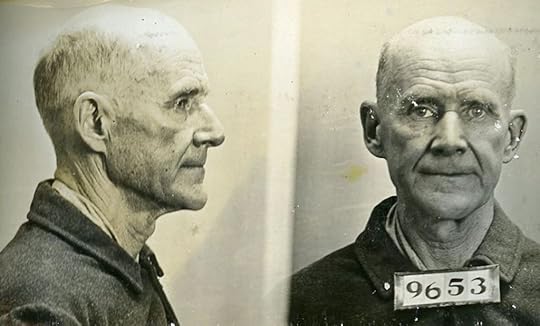Eugene Debs in 2024

David Michael Newstead | The Philosophy of Shaving
In college, it was the kind of thing that was only ever mentioned in passing. A kind of progressive anecdote. In 1920, socialist Eugene Debs received a million votes in the presidential election even though he was in prison. Then, this interesting fact would fit neatly into a conversation about the Wobblies (Industrial Workers of the World) and the legacy of American populism a century ago. We leafed through our copies of Howard Zinn, but history still felt distant at the time and almost mythical. In the 2020s, however, history isn’t some far off place anymore. It feels like its banging on our front doors and breaking through the screens of every device we own.
So then, I return to the subject of Eugene Debs. Debs was an American socialist leader and a perennial candidate for president, usually receiving vote totals in the hundreds of thousands. But it wasn’t these activities or his labor organizing that ultimately got him sent to federal prison. His outspoken opposition to the First World War violated the draconian clauses of the Sedition Act of 1918. So, Debs was arrested in 1918, tried, and sentenced to ten years of jailtime. His attempts to overturn his conviction at the Supreme Court failed and he was imprisoned in April 1919 in Atlanta. Eugene Debs was in his mid-60s at the time.
For many people, this civil libertarian nightmare was just a sideshow to the main event: the 1920 presidential election. Today, we remember Warren G. Harding’s “Return to Normalcy” and little else about this race. In it, Debs campaigned from his prison cell through letters and articles, receiving over 900,000 votes or 3.41 of the popular vote. Harding, the Republican, won in a landslide, defeating Democrat James Cox (forefather of Cox Communications). The Sedition Act was soon after repealed in December 1920 and President Harding commuted Debs’ sentence on Christmas 1921. In 1926, he died at age 70, then emerged as a left-wing folk hero in the years that followed.
Today, Eugene Debs and his style of populism stand in bizarre contrast to the populism of 2024. World War One era laws still cast a long shadow thanks to the Espionage Act of 1917. And presidential candidates campaigning from prison might not be the political novelty they once were. The only question that remains is, will there ever be a return to normalcy? Or is that where these particular historical parallels end?
JSTOR Daily: A Million Americans Once Voted for an Incarcerated Socialist



